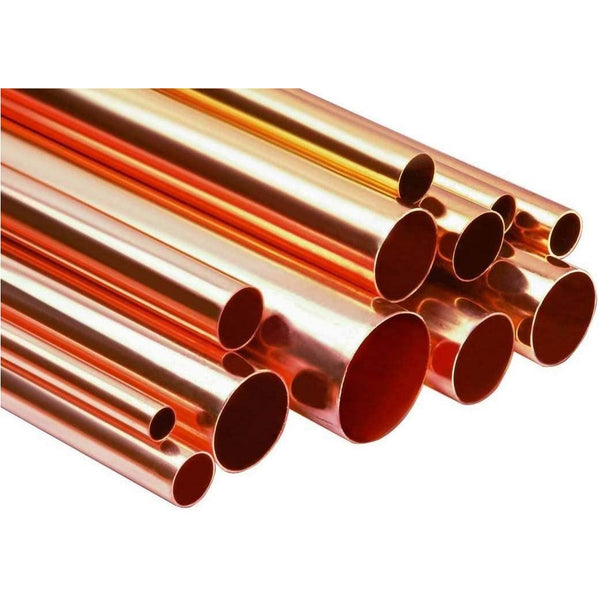From Art to Capability: The Many Applications of Special Copper Products
From Art to Capability: The Many Applications of Special Copper Products
Blog Article
Exploring the Diverse Applications of Copper Products in Modern Industries
Copper items have developed themselves as indispensable components across a myriad of modern sectors, mostly because of their exceptional conductivity, pliability, and resistance to corrosion. From improving the efficiency of electric systems to playing an essential role in eco-friendly power technologies, the flexibility of copper is evident. Its recyclability settings it as a sustainable selection in production and electronic devices. As markets progressively prioritize advancement and sustainability, the diverse applications of copper require a closer exam, especially concerning their potential effect on future environmental methods and technical improvements.
Electric Applications of Copper
Copper is a crucial material in the electric sector, making up around 60% of the overall need for non-ferrous steels around the world - Copper Products. Its superior electrical conductivity, which is almost twice that of aluminum, makes it the favored option for a vast array of electric applications. From electrical wiring systems in commercial and property buildings to high-voltage power transmission lines, copper makes sure performance and dependability in electrical energy delivery
In enhancement to wiring, copper is indispensable to the manufacturing of electric components such as motors, transformers, and generators. These elements leverage copper's thermal conductivity and malleability, necessary for warm dissipation and effective performance. Copper's resistance to deterioration enhances the lifespan and toughness of electric systems, making it a cost-effective option in the lengthy term.
The growth of renewable resource sources, such as solar and wind power, has actually better raised the need for copper in electric applications. As industries transition in the direction of lasting energy services, copper's duty becomes a lot more important. In general, the flexibility and performance characteristics of copper solidify its condition as a cornerstone product within the electrical market, driving development and performance throughout numerous applications.
Plumbing and Piping Solutions
In contemporary pipes systems, the option of materials considerably affects both functionality and durability. Copper has actually arised as a recommended alternative due to its distinct buildings, including rust resistance and antimicrobial attributes. These characteristics ensure that copper piping stays sturdy and safe for delivering potable water, an important factor to consider in residential and business applications.
Among the crucial advantages of copper in pipes is its capacity to endure high temperatures and pressures, making it ideal for a selection of applications, from warm water systems to home heating and cooling down networks. Additionally, copper's adaptability enables for less complicated installment in intricate piping formats, minimizing the risk of failings and leaks.
Another noteworthy advantage is copper's long life-span, often going beyond 50 years with appropriate upkeep. This long life not just reduces substitute prices however additionally adds to lasting methods by lowering waste. Moreover, copper's recyclability straightens with modern ecological standards, advertising a circular economic climate within the plumbing industry.
Copper in Renewable Resource
The adaptability of copper expands past pipes applications, playing a crucial duty in the eco-friendly power field. In solar panels, copper is used in photovoltaic cells and circuitry, helping with effective energy conversion and transmission.

Moreover, as the global demand for electrical automobiles (EVs) boosts, copper's duty in battery systems and charging infrastructure comes to be a lot more considerable. The product's capability to perform electrical energy successfully is indispensable to the efficiency of EV batteries, boosting variety and charging speed.
Copper's Function in Electronics
Electronics making counts heavily on copper's outstanding here properties, particularly its high electric conductivity and thermal performance. These features make copper an excellent selection for a large range of digital elements, consisting of ports, circuit boards, and electrical wiring. The steel's capability to successfully send electrical signals guarantees very little power loss, which is important in high-performance electronic tools.
In addition, copper's thermal conductivity plays a considerable function in heat dissipation, safeguarding sensitive parts from overheating. This is especially important in modern electronics, where portable styles result in boosted heat generation. Copper is likewise favored for its malleability and ductility, permitting it to be quickly shaped right into elaborate styles that fulfill the needs of innovative electronic applications.
With the rise of customer electronics, telecommunications, and electrical vehicles, the need for copper in the electronic devices market continues to expand. As technologies in technology advance, copper remains important to attaining greater efficiency and reliability in digital items. Its recyclability even more improves its allure, as manufacturers seek lasting services without endangering top quality. Hence, copper stays a cornerstone material in the ever-expanding area of electronic devices.
Ingenious Utilizes in Manufacturing

One significant application is in additive production, where copper-based materials are utilized in 3D printing processes. This enables for the creation of lightweight parts and complex geometries, specifically in the aerospace and automobile fields. Furthermore, copper's thermal conductivity makes it a suitable option for heat exchangers, boosting performance in commercial cooling systems.
Moreover, the surge of smart production has actually seen the unification of copper in IoT devices, where its conductive capacities support sophisticated noticing modern technologies. In the world of eco-friendly energy, copper is critical in the production of solar panels and wind generators, promoting extra effective power conversion and distribution.
As sectors pursue sustainability and innovation, copper's flexibility and efficiency proceed to place it as a crucial material, driving improvements in manufacturing and contributing to the growth of smarter, extra efficient products.
Final Thought
The integral role of copper in renewable energy and its vital feature in electronics emphasize its significance in advancing sustainable methods. Collectively, these applications highlight copper's essential payment to technical progression and industrial efficiency in modern culture.
From enhancing the performance of electrical systems to playing an essential duty in renewable power modern technologies, the adaptability of copper is noticeable. As industries progressively prioritize innovation and sustainability, the varied applications of copper call for a closer assessment, especially concerning their possible impact on future technical Check Out Your URL innovations and environmental techniques.
The development of eco-friendly power resources, such as solar and wind power, has better boosted the demand for copper in electrical applications. Generally, the flexibility and performance features of copper solidify its status as a foundation material within the electrical sector, driving advancement redirected here and effectiveness throughout numerous applications.
The versatility of copper prolongs past pipes applications, playing an essential role in the renewable power market.
Report this page